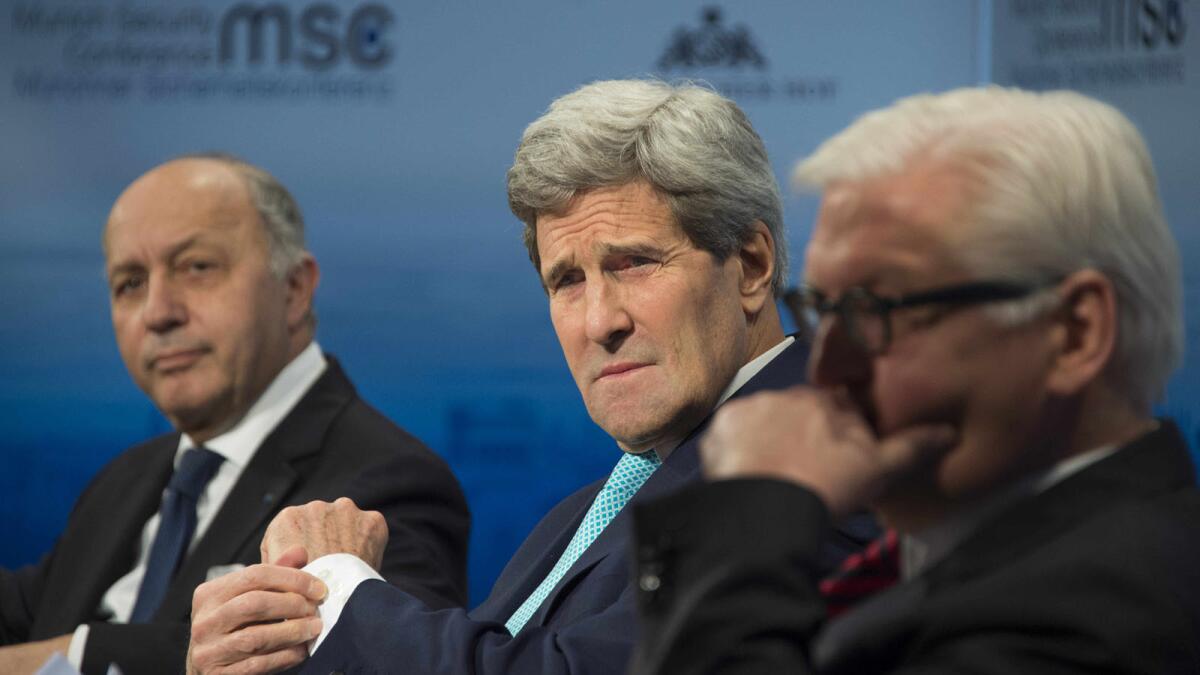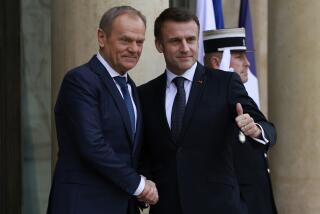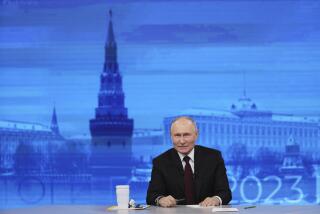Western unity over Ukraine-Russia crisis begins to show cracks

Through nine months of struggle to halt Russia’s military thrust into Ukraine, Western unity has been a foremost priority for American and European leaders.
Now, with the crisis entering a dangerous new phase, that solid front is in danger of collapsing.
As President Obama and German Chancellor Angela Merkel prepare to meet Monday at the White House, an increasingly public argument has broken out among Western officials over whether to arm the Ukrainian government.
A growing number of U.S. officials, and some in Europe, particularly in countries bordering Russia, believe that the only way to dissuade Russian President Vladimir Putin from continuing what they see as an invasion of Ukraine is to raise the military cost to Moscow. That means giving the Ukrainians better weapons, they say.
If the West fails to arm Ukraine to defend itself, Putin will expand the territory that Russian-supplied rebel groups hold in the eastern part of the country enough to open a land route from Russia to the Crimea region, which Russia invaded and annexed last year, backers of arms shipments say. An emboldened Putin could then start threatening other neighbors, particularly the Baltic states, they warn.
But the Germans, French and many other European leaders are equally convinced that arming the Kiev government will not halt Putin, but will increase carnage in a war that already has killed about 5,300 people and risk an all-out East-West confrontation.
In this view, the Kremlin, acting through the rebel groups it backs, could always escalate more quickly and crush Ukrainian government forces, no matter how many weapons the West supplied.
“We’re looking at a potential breaking point in the effort to keep the U.S. and Europe aligned,” said Andrew Weiss, a vice president and Russia specialist at the Carnegie Endowment for International Peace.
European officials tried last week to paper over the disagreement by leaving some ambiguity about their position. But over the weekend, the differences lurched fully into view. That has raised the stakes for Monday’s White House meeting.
Merkel, speaking at a security conference in Munich, Germany, made clear that not only would Germany not contribute arms, but it also opposed allies doing so.
“Military means will lead to more victims,” she said, arguing that the West should apply a patient containment approach toward Russia.
U.S. Sens. John McCain (R-Ariz.) and Lindsey Graham (R-S.C.) accused her of 1930s-style appeasement — a charge German officials resented.
European and Ukrainian officials said Sunday that they hoped to meet Russian leaders Wednesday in Minsk, Belarus, to try again to reach a cease-fire. Having that meeting on the schedule will allow Obama and Merkel to appear united as they take questions during a news appearance Monday.
But diplomats haven’t put much new on the table in the last few days, and hopes for the Minsk meeting are limited. So the differences over the arms issue will loom as Obama and Merkel discuss Ukraine and other issues during four hours of talks.
Merkel will receive much more of Obama’s time than she did when they met last spring. Because of Germany’s lead on the Ukraine issue and on the revived economic and political crisis threatening the European Union, she is now the most important EU leader.
Obama may be closer to Merkel’s position than to the views of many in his own government. Like her, he believes in moving cautiously.
Vice President Joe Biden and Defense secretary nominee Ashton Carter have been full-throated in demands for action to stop Putin. They advocate sending the Ukrainians antitank weapons and other arms. But Obama, in public comments, has seemed deeply reluctant to risk a further escalation. The global strategy paper the administration issued Friday made clear that the White House views the situation in Ukraine as a second-tier threat.
One approach Obama might take is to offer arms, but do so slowly with only a trickle of weapons. That’s the approach Obama took in arming Syrian rebels fighting the government of President Bashar Assad. Thus far, the United States has been helping Kiev with only nonlethal military equipment, such as night-vision goggles and armored vests.
“If I were betting, I would bet on a slow build,” said Jacob Stokes of the Center for a New American Security, a Washington think tank.
Yet it’s not clear that going small would overcome the Western rift. Although German public opinion has grown increasingly unhappy with Putin, it remains decidedly against any escalation.
Some U.S. officials and lawmakers believe they may need to start acting unilaterally, because the European Union’s own unity may now be in question. While Poland and the Baltic states view the Ukraine crisis as an existential threat, others, most notably Greece, have moved closer to Moscow and appear to oppose even additional sanctions.
Other possible remedies, such as trying to buy off Putin by promising economic help, are long-term propositions that seem to offer little hope.
For a large group in Washington, says Carnegie’s Weiss, “the attitude is, ‘We’ve tried everything, Putin has ignored it all, we’re out of patience — it’s time to try something new.’”
Times staff writer Kathleen Hennessey contributed to this report.
More to Read
Start your day right
Sign up for Essential California for news, features and recommendations from the L.A. Times and beyond in your inbox six days a week.
You may occasionally receive promotional content from the Los Angeles Times.







